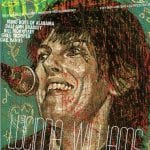Lucinda Williams – Happy Woman Blues
It probably won’t surprise anybody to learn that Lucinda Williams drives a truck. A big ole truck — Chevy Silverado with a king cab and hard-shell bed-cover. She doesn’t take up much of the wide bench seat and sits close to the steering wheel. Magazine photographs make her look like a tall, gangly woman made up of all legs and arms, but in truth she is no bigger than a breath.
Tonight, cruising the streets of Nashville in her truck with that fine, brand-new-car scent, she seems completely at ease. She weaves in and out of racing traffic without half-thinking about it. She holds onto the wheel with one hand and navigates the streets as if she were born here.
That’s the thing about Lucinda — she’s surprising. After all the media attention she received for Car Wheels On A Gravel Road, some journalists felt compelled to paint a picture of Lucinda as an out-of-control diva. It’s obvious tonight that she has it together, but on the other hand, she wouldn’t be too upset if she didn’t. She is a country boy’s dream: a smart-as-hell woman driving a cool truck.
Check this out: She’s happy, too.
Before we ever pile into her Chevy and hit the road, I arrive at Lucinda’s house to find a note on the door: Come on in. I’m running late. Make yourself at home. When I enter, a Big Mouth Billy Bass greets me, sitting alone on a long foyer table. Over it hangs a clock encircled by these words: “Bless the Lord At All Times.”
Lucinda is running up the stairs. “I’m sorry!” she hollers. “Just come on in and be at home.” It’s easy to feel at home here. Though stunning folk art graces the walls, it doesn’t feel like one of those homes where you’re afraid to sit down. It’s no museum. A sad fiddle and an Irish-sounding voice pour from the stereo. She has left me a bottle of Cabernet Sauvignon on the coffee table, along with a lone glass and a bowl of goldfish crackers.
The room will either make you feel intimidated or safe. There is a wall of crosses and religious art. Day of the Dead skeleton figures play guitars on the fireplace mantle. A wooden snake stretches the length of one wall over a sofa. A screened-in porch connects to the living room, and on its railing sit eight tall candles, each of them labeled for a different use. There is one that is to be burned for the Spirit of Writing, one for the Spirit of Music, another for Protection From Bad Hairdressers, even one to invoke a Peaceful Home. The candles to conjure music and writing have been burned the most.++++++++++++++++++++++++++++++++++++++++
This is an excerpt of the full article which appeared in The Best of No Depression: Writing About American Music, which features 25 of the finest articles from the magazines back issues, and was published in 2005 by University of Texas Press to help celebrate the magazines 10th anniversary. Due to our agreement with UT Press we are unable to include this article in our online archive.
The Best of No Depression is the only place you can find these articles other than our back issues. Visit the No Depression store to buy your copy for only $10.
The 300-page volume includes co-editor Grant Aldens award-winning 2001 feature on Billy Joe Shaver, co-editor Peter Blackstocks 1998 Artist of the Decade piece on Alejandro Escovedo, senior editor Bill Friskics-Warrens 2002 cover story on Johnny Cash, contributing editor Paul Cantins deep exploration of Yankee Hotel Foxtrot-era Wilco; and many other high points from our print heyday.
Table of contents for The Best of No Depression:
Preface, by Grant Alden and Peter Blackstock
Los Lobos, by Geoffrey Himes
Alejandro Escovedo, by Peter Blackstock
Jon Dee Graham, by Peter Blackstock
Billy Joe Shaver, by Grant Alden
Ray Wylie Hubbard, by John T. Davis
Flatlanders, by Don McLeese
Ray Price, by David Cantwell
Johnny Gimble, by Bill C. Malone
Johnny Cash, by Bill Friskics-Warren
Rosanne Cash, by Lloyd Sachs
Lucinda Williams, by Silas House
Buddy & Julie Miller, by Bill Friskics-Warren
Kasey Chambers, by Geoffrey Himes
Loretta Lynn, by Barry Mazor
Patty Loveless, by Bill Friskics-Warren
Kieran Kane, by Peter Cooper
Paul Burch, by Jim Ridley
Hazel Dickens, by Bill Friskics-Warren
Gillian Welch, by Grant Alden
Ryan Adams, by David Menconi
Jay Farrar, by Peter Blackstock
Jayhawks, by Erik Flannigan
Wilco, by Paul Cantin
Drive-By Truckers, by Grant Alden
Iron & Wine, by William Bowers




